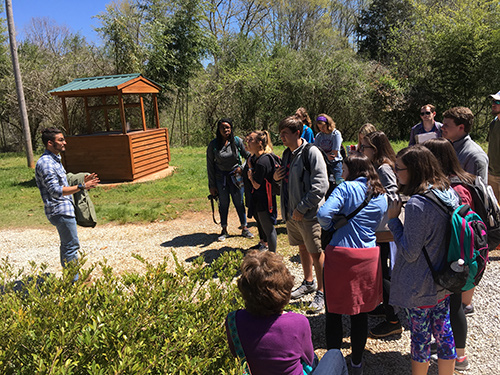
by Olivia Odom
In Samford University’s College of Health Sciences, the School of Public Health strives to educate students on the determinants of health, while equipping them with appropriate solutions to promote health and remove barriers locally and globally.
Students in assistant professor Kim Davey’s and associate professor Rachel Casiday’s undergraduate public health courses were able to experience these problems and solutions firsthand during a visit to Servants in Faith and Technology (SIFAT) in Lineville, Alabama.
SIFAT provides students with the opportunity to see conditions and issues regularly encountered in the field of public health and to learn how to address these needs in appropriate and sustainable ways. The trip exposed students to topics such as sanitation, water filtration, indoor air pollution and many more.
Students heard from former missionary and one of SIFAT’s founders, Sarah Corson, about her strong belief in the integrated Gospel, which means meeting a population’s physical needs along with its spiritual needs, and her commitment to the principle of “love thine enemy.”
“SIFAT is an incredible place where you can experience the poverty that the world faces without even leaving Alabama,” said Sarah Duke, senior biochemistry major. “The experience made me realize how little people in impoverished nations have, and how the technologies and methods SIFAT develops are incredibly vital to communities in need of the basics like food and water.”
Duke shared her favorite part of the experience: cricket farming. “It is more sustainable and takes fewer resources to raise, eat and sell crickets than cows. We even got to prepare and eat some crickets, which were pretty good. This trip furthered my passion for going into communities and teaching and helping people live healthier lives,” Duke said.
In the afternoon, faculty and students walked through SIFAT’s “global village,” which replicates housing conditions in different areas of the world, including slums.
“With my family being Haitian, I know what the lifestyle consists of, but I’ve never had the opportunity to actually experience it,” said Deion Pierre, junior public health major. “I grew up in a bad situation, but when walking through the slums, I felt like I was given the silver spoon.”
This is the second year Davey and Casiday have led the trip to SIFAT, and it definitely will not be the last.
“I enjoy seeing how SIFAT can play into a student’s personal passion, purpose and calling. The trip exposes students to the integral role public health plays in promoting and addressing the determinants of health,” said Davey. “Further, SIFAT captures the intersection of faith and health, and highlights tangible ways we can share and reveal God’s love while working to improve health in communities locally and globally.”
Olivia Odom is a journalism and mass communication major and a news and feature writer in the College of Health Sciences.